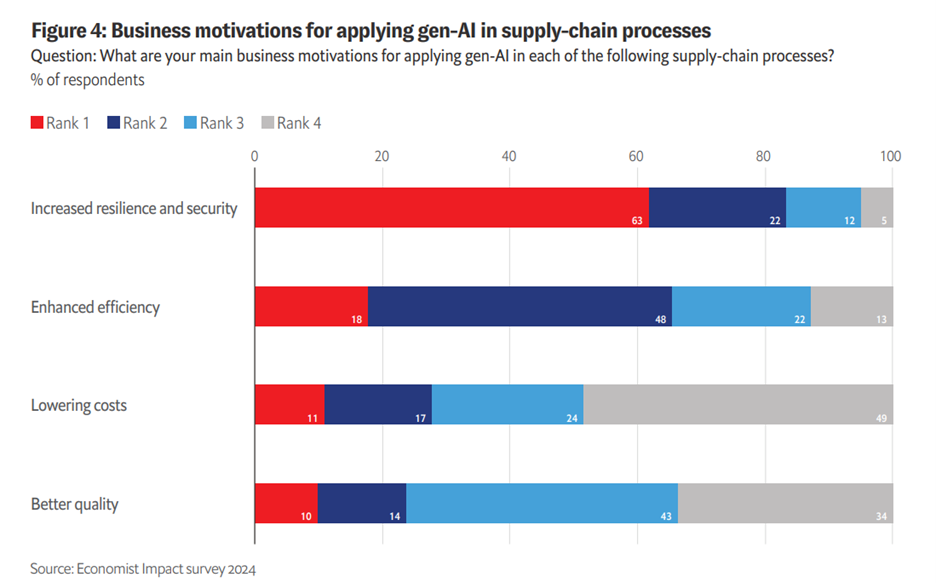
Leaders Applying Gen AI in Supply Chains for Resilience Rather Than Efficiency, Economist Impact Survey Indicates
- Contrary to perception, leaders want to use generative AI more to build resiliency and security than to gain efficiency.
- According to a recent Economist Impact survey, the main reason for applying generative AI to supply chains, cited by 63% of executives, is to enhance both resilience and security.
- Only 18% ranked enhanced efficiency as the main motivation for implementing generative AI in their supply chain, and only 11% ranked cost reduction as number one motivation.
July 15, 2024 | Supply Chain Software
With inflation decreasing, interest rates leveling off and supply chain volatility easing, 2024 has given procurement and supply chain leaders a bit of a breather after the turbulence of the last few years.
While roadblocks and challenges remain, enterprises finally have a chance to think about the future and how best to implement game-changing new technologies like generative AI into their supply chains.
And the 2024 Economist Impact survey on next-gen supply chains, commissioned by GEP, reveals a notable shift in executives’ motivations when it comes to generative AI.
Resilience and Security Take Center Stage
The conventional wisdom on generative AI in supply chains is that it will dramatically improve productivity, helping enterprises leverage supply chain data to orchestrate activities with greater efficiency.
Contrary to that perception, however, a significant 63% of survey respondents cited enhancing resilience and security as the primary reason for applying generative AI to supply chains. This underscores the growing emphasis on mitigating risks and safeguarding operations against disruptions.
Efficiency Takes a Back Seat
Interestingly, only 18% of respondents ranked enhanced efficiency as their main motivation for leveraging generative AI in supply chains. While efficiency remains important, with 48% ranking it as their number two choice, it appears that other factors such as resilience and security have gained prominence in strategic decision-making.

Cost Reduction Trails Behind
Similarly, a mere 11% of executives identify cost reduction as their primary motivation for incorporating generative AI into supply chain operations. Nearly half of the respondents ranked lowering costs as their fourth (out of four) pick.
This suggests that enterprises are taking a nuanced approach to cost management, at least when it comes to implementing generative AI solutions, with organizations prioritizing broader objectives such as resilience and security over immediate cost-saving measures.
Also Read: Supply Chain Operations Management for Business Success
Balancing Multiple Objectives
The findings highlight the need for organizations to strike a balance between efficiency, resilience, security and cost reduction when deploying generative AI in supply chains – and that’s to say nothing of other important organizational objectives like sustainability.
It’s worth noting, however, that this question on the Economist Impact survey concerned generative AI, and other types of AI may be more in focus when it comes to driving new efficiencies.
Enterprises will need to align their AI initiatives with strategic objectives – by doing so, they can set themselves up to more effectively navigate uncertainties and strengthen their competitive advantage.
Redefining Supply Chain Priorities
The Economist Impact survey results underscore the importance of resilience and security as top priorities for enterprises in a global economy only recently recovered from the devastating effects of the COVID-19 pandemic. In adopting generative AI, there seems to be a clear consensus on where this new technology can offer the most impact.
This redefinition of priorities reflects the evolving landscape of global supply chains and emphasizes the importance of adaptability and preparedness in an increasingly complex environment.



